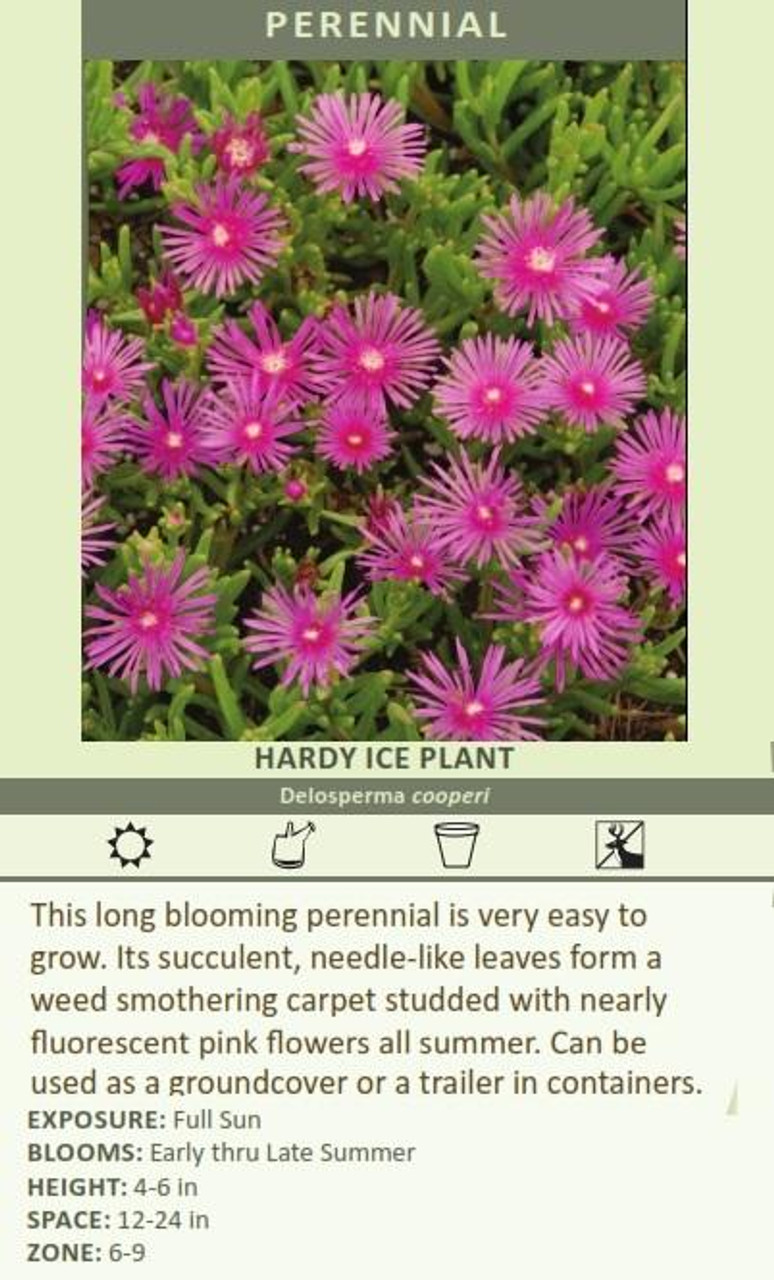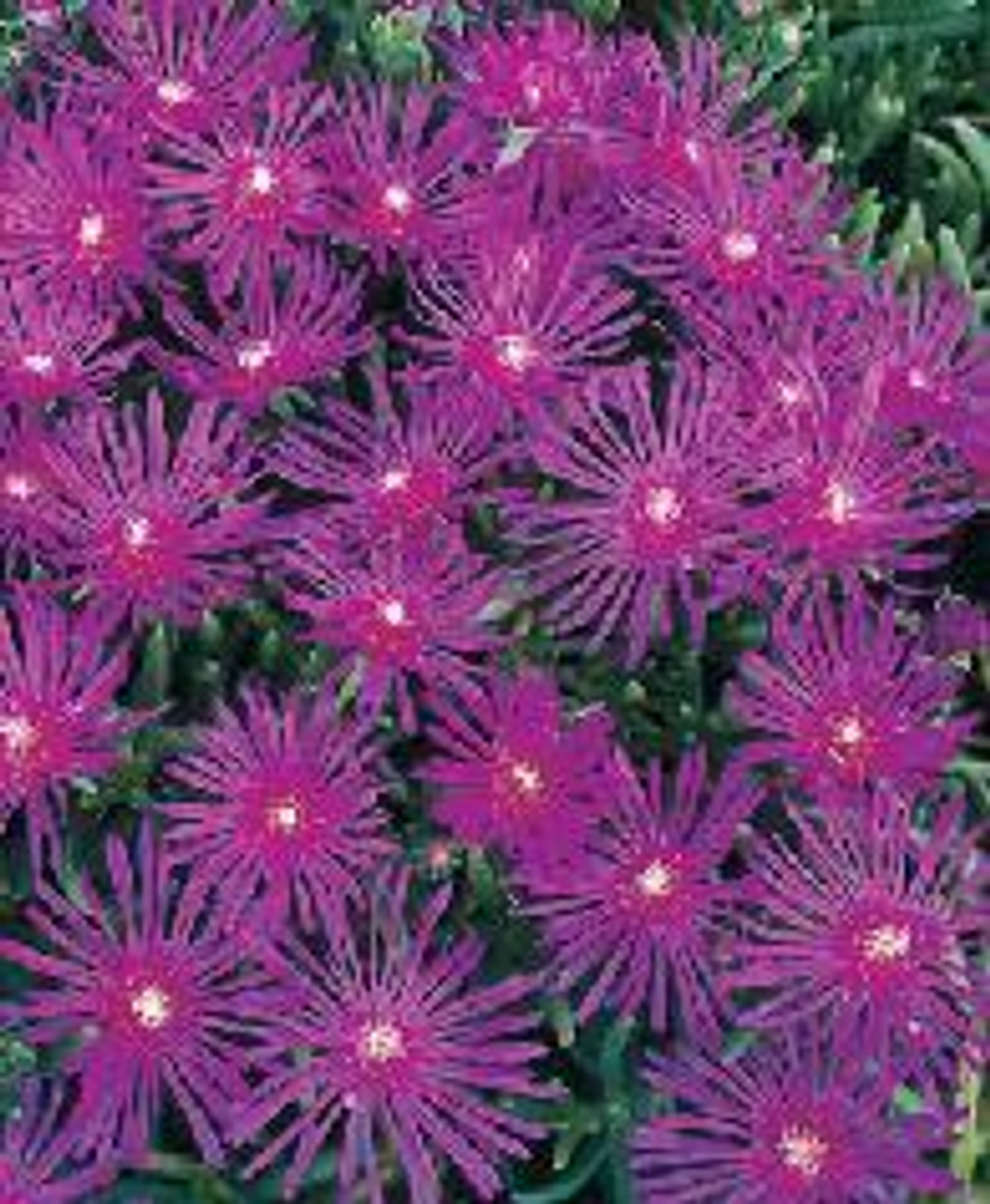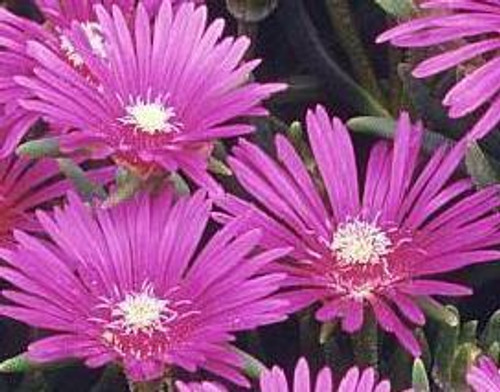Product Description
Delosperma cooperi (4) 1-gallons
Common Name: Trailing ice plant, hardy ice plant
Zones: 6 to 9;
Full sun and well-drained soil.
Embrace the vibrant beauty of Delosperma cooperi! This hardy succulent, also known as Hardy Ice Plant or Pink Carpet, is a beloved groundcover for sunny landscapes, offering a profusion of brilliant magenta flowers and lush, evergreen foliage.
- A Carpet of Color: Delosperma cooperi transforms gardens into a sea of vibrant color with its abundance of bright, daisy-like flowers in a striking magenta hue. These cheerful blooms, reaching up to 2 inches in diameter, appear in waves from late spring to fall, creating a long-lasting spectacle.
- Evergreen Foliage: The fleshy, blue-green leaves of Delosperma cooperi form a lush, mat-forming groundcover that adds texture and interest even when not in bloom. This evergreen foliage provides year-round beauty, especially in warmer climates where it remains vibrant throughout the winter.
- Hardy and Resilient: This ice plant is known for its hardiness and resilience, tolerating drought, heat, and even cold temperatures down to -20°F (-29°C). It is a perfect choice for challenging growing conditions, including xeriscaping, rock gardens, green roofs, or any area that receives full sun and has well-drained soil.
- Versatile Applications: This adaptable succulent is a versatile addition to any sunny garden. Use it to brighten borders, add a pop of color to containers, create a cheerful display in rock gardens, spill over walls, or even naturalize it in dry, sunny areas.
- Low-Maintenance Beauty: Delosperma cooperi is a low-maintenance gem that requires minimal care once established. Simply provide well-drained soil and occasional watering during prolonged dry periods.
Key Features:
- Magenta Flowers: Abundant blooms create a vibrant display.
- Evergreen Foliage: Provides year-round beauty and texture.
- Drought-Tolerant: Thrives in hot, dry conditions.
- Cold Hardy: Tolerates temperatures down to -20°F (-29°C).
- Versatile Applications: Suitable for borders, containers, rock gardens, and more.
- Low-Maintenance: Easy to grow and care for.
Plant Specifications:
- Hardiness Zones: 4-10
- Mature Size: 4-6 inches tall, spreading to 12-18 inches wide
- Sunlight: Full sun
- Soil: Well-drained soil
- Water: Low water needs
Add a touch of vibrant color and resilience to your garden with the dazzling blooms and lush foliage of Delosperma cooperi!
(4) 1-gallon containers ready to plant, plants maybe trimmed for shipping,
Other Details
The most important part of the plant is its root system. Healthy roots are the foundation of a healthy, vibrant plant. The type of plug container used is based on the specific needs of the plants. Perennials offered as bare root traditionally perform better when planted as bare root.Planted in a specialized mix, potted plants have well established root systems. Top growth stage will vary depending on the current life cycle and time of year when shipped. In Winter and early Spring dormant plants may be shipped. Dormant plants may be planted right away, even before the last frost date.
Most bare root varieties are field grown for at least one season, though Hemerocallis and Hosta are grown for two seasons. The bulk of the soil is removed during the harvesting process and the tops of most varieties are trimmed back to the crown. They are graded, packed in shredded aspen or sphagnum moss and stored in freezers until ready to be shipped.
See our Container Sizes and Bare Root Perennials pages for more information.
Plant information and care is provided in the Overview section, Plant Genus Page and general information is provided in the Planting Care & Guides. Additional questions can be asked on each Plant page.
Plant Spacing: Using the maximum mature spread or width of a plant to guide spacing, ensures space to grow to full size. To fill an area sooner, plant them closer together. Just remember, future thinning or transplanting may be needed.
Water: Keep a close eye on newly planted perennials, especially throughout the first growing year. Most early plant loss is due to too much or too little water!
















